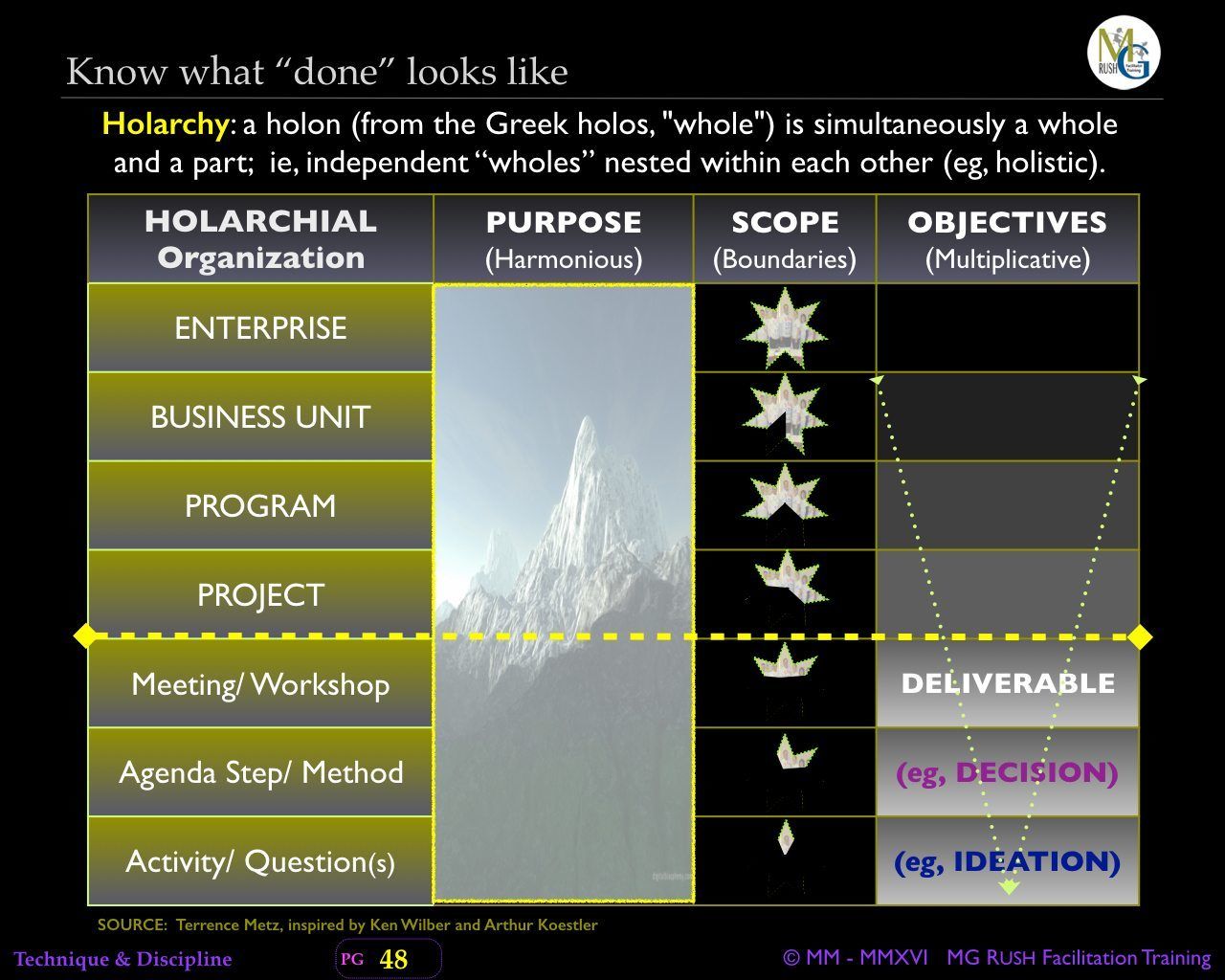Scope creep kills a lot of projects. Scope creep kills many more meetings. The hardest task to accomplish in leading a group of people is to get them to focus. Their minds drift, twist, and become partially selective.
When the right group of people is assembled, they can accomplish nearly any task at hand if the leader can get them to focus. Yet they continue to drift, and even begin to discuss and argue about issues that are not within the scope of the meeting as they impose their own scope creep.
Secrets to Prevent Meeting Scope Creep
There are two secrets to prevent scope creep in meetings. First, the session leader or facilitator needs to make the meeting scope clear when the meeting begins, as well as secure agreement from the participants about the meeting scope. Frequently meeting scope is limited by geography, duration, or situation—frequently it represents only PART OF the project scope.
When people argue about the validity or purpose of a project, for example, the discussion is usually NOT within the meeting scope. Only a conscious facilitator can police scope creep carefully.
Secondly, the facilitator needs to know the precise question that the group should be addressing. When the facilitator does not know the question, ANY answer is appropriate. Most meeting facilitators should focus on context before meetings rather than content, by knowing the right questions and the proper sequence to ask them. They also cannot afford to ask for the meeting deliverable, as that question is so broad as to be DUMB (i.e., Dull, Ubiquitous, Myopic, and Broad).
Ask Precise and Detailed Questions to Prevent Meeting Scope Creep
If a product marketing plan is the deliverable, you cannot ask “What is the product deliverable?” For example, a marketing plan is a function of segmentation, targeting, positioning, market mix, message, medium, etc. If the question is “What are our top three market segments?” the facilitator cannot allow arguments over social media, as such content is out of the scope of the question at hand.
The holarchy above illustrates the narrowing of the scope of the enterprise through the question being discussed in a meeting. The facilitator’s role is to know the precise questions that support the completion of agenda steps that support the completion of the meeting deliverables that support the completion of the project, etc. When the facilitator does not know the right question to ask, all hell breaks loose, and rightfully so, scope creeps . . . Do not let that happen to you.
______
Don’t ruin your career by hosting bad meetings. Sign up for a workshop or send this to someone who should. MGRUSH workshops focus on meeting design and practice. Each person practices tools, methods, and activities every day during the week. Therefore, while some call this immersion, we call it the road to building high-value facilitation skills.
Our workshops also provide a superb way to earn up to 40 SEUs from the Scrum Alliance, 40 CDUs from IIBA, 40 Continuous Learning Points (CLPs) based on Federal Acquisition Certification Continuous Professional Learning Requirements using Training and Education activities, 40 Professional Development Units (PDUs) from SAVE International, as well as 4.0 CEUs for other professions. (See workshop and Reference Manual descriptions for details.)
Want a free 10-minute break timer? Sign up for our once-monthly newsletter HERE and receive a timer along with four other of our favorite facilitation tools, free.

Terrence Metz, president of MG RUSH Facilitation Training, was just 22-years-old and working as a Sales Engineer at Honeywell when he recognized a widespread problem—most meetings were ineffective and poorly led, wasting both time and company resources. However, he also observed meetings that worked. What set them apart? A well-prepared leader who structured the session to ensure participants contributed meaningfully and achieved clear outcomes.
Throughout his career, Metz, who earned an MBA from Kellogg (Northwestern University) experienced and also trained in various facilitation techniques. In 2004, he purchased MG RUSH where he shifted his focus toward improving established meeting designs and building a curriculum that would teach others how to lead, facilitate, and structure meetings that drive results. His expertise in training world-class facilitators led to the 2020 publication of Meetings That Get Results: A Guide to Building Better Meetings, a comprehensive resource on effectively building consensus.
Grounded in the principle that “nobody is smarter than everybody,” the book details the why, what, and how of building consensus when making decisions, planning, and solving problems. Along with a Participant’s Guide and supplemental workshops, it supports learning from foundational awareness to professional certification.
Metz’s first book, Change or Die: A Business Process Improvement Manual, tackled the challenges of process optimization. His upcoming book, Catalyst: Facilitating Innovation, focuses on meetings and workshops that don’t simply end when time runs out but conclude with actionable next steps and clear assignments—ensuring progress beyond discussions and ideas.




